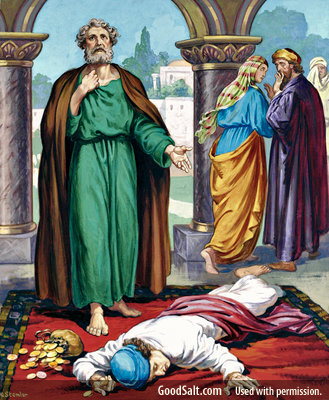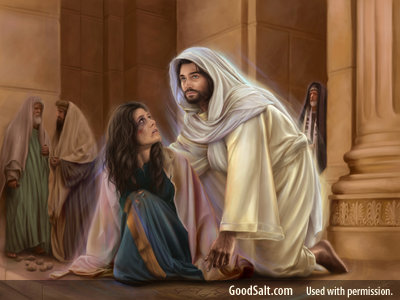(Acts 5:1-11) Did God Kill Ananias and Sapphira?
 “But a certain man named Ananias, with Sapphira his wife, sold a possession, And kept back part of the price, his wife also being privy to it, and brought a certain part, and laid it at the apostles' feet. But Peter said, Ananias, why hath Satan filled thine heart to lie to the Holy Ghost, and to keep back part of the price of the land? Whiles it remained, was it not thine own? and after it was sold, was it not in thine own power? why hast thou conceived this thing in thine heart? thou hast not lied unto men, but unto God. And Ananias hearing these words fell down, and gave up the ghost: and great fear came on all them that heard these things. And the young men arose, wound him up, and carried him out, and buried him. And it was about the space of three hours after, when his wife, not knowing what was done, came in. And Peter answered unto her, Tell me whether ye sold the land for so much? And she said, Yea, for so much. Then Peter said unto her, How is it that ye have agreed together to tempt the Spirit of the Lord? behold, the feet of them which have buried thy husband are at the door, and shall carry thee out. Then fell she down straightway at his feet, and yielded up the ghost: and the young men came in, and found her dead, and, carrying her forth, buried her by her husband. And great fear came upon all the church, and upon as many as heard these things.” (Acts 5:1-11)
“But a certain man named Ananias, with Sapphira his wife, sold a possession, And kept back part of the price, his wife also being privy to it, and brought a certain part, and laid it at the apostles' feet. But Peter said, Ananias, why hath Satan filled thine heart to lie to the Holy Ghost, and to keep back part of the price of the land? Whiles it remained, was it not thine own? and after it was sold, was it not in thine own power? why hast thou conceived this thing in thine heart? thou hast not lied unto men, but unto God. And Ananias hearing these words fell down, and gave up the ghost: and great fear came on all them that heard these things. And the young men arose, wound him up, and carried him out, and buried him. And it was about the space of three hours after, when his wife, not knowing what was done, came in. And Peter answered unto her, Tell me whether ye sold the land for so much? And she said, Yea, for so much. Then Peter said unto her, How is it that ye have agreed together to tempt the Spirit of the Lord? behold, the feet of them which have buried thy husband are at the door, and shall carry thee out. Then fell she down straightway at his feet, and yielded up the ghost: and the young men came in, and found her dead, and, carrying her forth, buried her by her husband. And great fear came upon all the church, and upon as many as heard these things.” (Acts 5:1-11)
Here we read that Ananias and his wife Sapphira had sold a piece of property. They had decided to give only a portion of their earnings as an offering, but yet told everyone they were giving it all. The sin was not that they didn’t give it all, but that they lied saying they had given it all. They were not obligated to give it all as we see in Peter’s words, “was it not thine own? and after it was sold, was it not in thine own power?” After Peter exposes Ananias of this lie “Ananias hearing these words fell down, and gave up the ghost.” Three hours later, after Peter interrogates Sapphira “then fell she down straightway at his feet, and yielded up the ghost.” Most commentators believe that God or an angel killed Ananias and Sapphira as a punishment for their sin.
How Did They Die?
Nothing in this narrative says anything about God or an angel killing them. However, even if it did, we would still have the example of king Saul who committed suicide with his own sword (1 Chronicles 10:3-5) and yet Scripture says, “So Saul died for his transgression which he committed against the LORD, even against the word of the LORD, which he kept not, and also for asking counsel of one that had a familiar spirit, to inquire of it; And inquired not of the LORD: therefore He (God) slew him, and turned the kingdom unto David the son of Jesse.” (Verses 13, 14).
This writing style is called a Hebrew idiom, in which God is said to do something that He only permits to be done. God “slew” Saul by not preventing him from committing suicide. Although the writer says God slew him, God is NOT the one who killed Saul. Saul clearly killed himself. So even if the book of Acts said God killed Ananias and Sapphira we would still understand it as it reads from the Hebraic idiom. Therefore, it is quite possible that Ananias and his wife committed suicide. This was also the end-result after “Satan entered Judas” and he hung himself after feeling the overwhelming guilt and mental anguish of betraying Jesus (Luke 22:3, 4; Acts 1:16-18).
Another possibility, and the most probable, is that their overwhelming guilt and self-condemnation was enough to kill them. Note what it says in Ellicott's Commentary for English Readers:
“It is to be noted that St. Peter’s words, while they press home the intensity of the guilt, do not contain any formal sentence … The shame and agony of detection, the horror of conscience not yet dead, were enough to paralyse the powers of life. Retribution is not less a divine act because it comes, through the working of divine laws, as the natural consequence of the sin which draws it down … And we must remember that there is a silence which we may not dare to break as to all but the visible judgment. The dominant apostolic idea of such punishments was that men were delivered to Satan for the destruction of the flesh, that the spirit might be saved in the day of the Lord Jesus (1 Corinthians 5:5).”
This commentary rings true; for Peter did say, “Ananias, why hath Satan filled thine heart to lie to the Holy Ghost, and to keep back part of the price of the land?” Satan had filled their hearts, thus they were given over to Satan, the master whom they themselves had chosen, for destruction. It is Satan who is the destroyer:
“Be sober, be vigilant; because your adversary the devil, as a roaring lion, walketh about, seeking whom he may devour.” (1 Peter 5:8)
Satan had filled their hearts and thus guilt and self-condemnation took over. Their sin hid (clouded) the merciful face of God so that they did not believe in His everlasting mercy and kindness (Isaiah 59:2). They were given over to the judgment they had pronounced upon themselves (Matthew 7:1, 2; Luke 6:36, 37). This self-judgment always leads to death just as Paul told the unbelieving Jews:
“Then Paul and Barnabas waxed bold, and said, It was necessary that the word of God should first have been spoken to you: but seeing ye put it from you, and judge yourselves unworthy of everlasting life, lo, we turn to the Gentiles.” (Acts 13:46)
God’s forgiveness is always present, but if it is not received by the forgiven sinner, then the inherent consequence of that sin is death. It is sin that kills the sinner, not God. There is no need for God to interfere to take the life of a sinner. Sin takes the life automatically.
“For the wages of sin is death; but the gift of God is eternal life through Jesus Christ our Lord.” (Romans 6:23)
“But every man is tempted, when he is drawn away of his own lust, and enticed. Then when lust hath conceived, it bringeth forth sin: and sin, when it is finished, bringeth forth death.” (James 1:14, 15)
 Luke, the writer of Acts, said, “And great fear came upon all the church, and upon as many as heard these things.” Would a God of love want to cause fear among His church? Did He settle for fear as being the motivating factor of obedience to Him? Never! God’s kingdom never operates on force, coercion, nor fear. He only desires obedience based on love because “There is no fear in love; but perfect love casteth out fear: because fear hath torment. He that feareth is not made perfect in love. We love him, because He first loved us.” (1 John 4:18, 19). Fear only brings torment of mind and heart. Jesus foretold that “men’s hearts” will fail them from “fear and the expectation of those things which are coming on the earth” (Luke 21:26).
Luke, the writer of Acts, said, “And great fear came upon all the church, and upon as many as heard these things.” Would a God of love want to cause fear among His church? Did He settle for fear as being the motivating factor of obedience to Him? Never! God’s kingdom never operates on force, coercion, nor fear. He only desires obedience based on love because “There is no fear in love; but perfect love casteth out fear: because fear hath torment. He that feareth is not made perfect in love. We love him, because He first loved us.” (1 John 4:18, 19). Fear only brings torment of mind and heart. Jesus foretold that “men’s hearts” will fail them from “fear and the expectation of those things which are coming on the earth” (Luke 21:26).
Could this be how Ananias and Sapphira died - that their hearts failed them from fear not believing in God’s love? In an article on characterofgod.org, Ray Foucher writes this concerning their death:
“The feelings of guilt and shame in the presence of the leadership of the church and in his situation could have essentially caused him to give up on life. Perhaps something like a heart attack was involved and, in fact, there is a condition known popularly as broken-heart syndrome and medically as stress-induced cardiomyopathy.
‘Stress cardiomyopathy is now a well-recognized cause of acute heart failure.’ (https://en.wikipedia.org/wiki/Takotsubo_cardiomyopathy).
This University of Iowa source gives a little more detail:
‘Severe physical and emotional stressors—the death of a loved one, a catastrophic event, financial loss, a serious medical condition, a car accident, or an emotional memory or anniversary—have been well known to cause transient heart stunning. The connection between emotion and cardiac death has long been documented in the medical literature, and there have been many reports of seemingly healthy people who have dropped and even died during a natural disaster or traumatic event.’ (https://uihc.org/health-library/ask-expert-what-broken-heart-syndrome)”
A Similar Situation
“And when Simon saw that through laying on of the apostles' hands the Holy Ghost was given, he offered them money, Saying, Give me also this power, that on whomsoever I lay hands, he may receive the Holy Ghost. But Peter said unto him, Thy money perish with thee, because thou hast thought that the gift of God may be purchased with money. Thou hast neither part nor lot in this matter: for thy heart is not right in the sight of God. Repent therefore of this thy wickedness, and pray God, if perhaps the thought of thine heart may be forgiven thee. For I perceive that thou art in the gall of bitterness, and in the bond of iniquity. Then answered Simon, and said, Pray ye to the Lord for me, that none of these things which ye have spoken come upon me.” (Acts 8:18-24)
Here Simon wants to buy the power of the Holy Spirit. Peter rebukes him just as he did Ananias and Sapphira for their wrong motives, even saying “Thy money perish with thee.” But this conviction resulted in Simon repenting saying, “Pray ye to the Lord for me, that none of these things which ye have spoken come upon me.” He would not have asked that of Peter if he did not believe in God’s forgiveness. Would the story of Ananias and Sapphira had ended the same if they had sought the Lord for help?
Another example is found with king David. In 2 Samuel 24:1 we read:
“And again the anger of the LORD was kindled against Israel, and He moved David against them to say, Go, number Israel and Judah.”
Here we read one of those idioms again where God is said to do something that which He only permits to happen. This concept is so vital in order to understand Scripture. Did God really make David number the people? Not according to 1 Chronicles 21:1 which speaks of the same incident:
“And Satan stood up against Israel, and provoked David to number Israel.”
So just like Ananias and his wife, Satan had taken over David. The anger of the LORD was experienced by the removing of God’s presence which permitted Satan to provoke David to go ahead and number the people.1 Why didn’t David die? He repented believing in God’s everlasting mercy:
“And David's heart smote him (his conscience bothered him) after that he had numbered the people. And David said unto the LORD, I have sinned greatly in that I have done: and now, I beseech Thee, O LORD, take away the iniquity of thy servant; for I have done very foolishly.” (2 Samuel 24:10)
One of the works of the Holy Spirit is to “convict the world of sin” (John 16:8). God does not do this to condemn, but to magnify the sin so we will seek Him for grace and healing.
“Moreover the Law entered (the heart), that the offence might abound. But where sin abounded, grace did much more abound: That as sin hath reigned unto death, even so might grace reign through righteousness unto eternal life by Jesus Christ our Lord.” (Romans 5:20, 21)
 Imagine if Jesus was there when Ananias and his wife came into the room. What do you think He would have said? I believe He would have said exactly what He told the adulterous woman, “Where are those thine accusers? hath no man condemned thee? … Neither do I condemn thee: go, and sin no more.” (John 8:10, 11). The question is would they have believed it as the adulterous woman did?
Imagine if Jesus was there when Ananias and his wife came into the room. What do you think He would have said? I believe He would have said exactly what He told the adulterous woman, “Where are those thine accusers? hath no man condemned thee? … Neither do I condemn thee: go, and sin no more.” (John 8:10, 11). The question is would they have believed it as the adulterous woman did?
In Ray Foucher’s article mentioned above he questions Peter’s attitude and that it may have been different towards Ananias and his wife than it was with Simon. Did Peter mention anything about repentance to Ananias and Sapphira like he did to Simon? Perhaps Peter was a little too harsh with them and did not display the non-condemning character of Jesus which led to their overwhelming fear (Proverbs 15:1). Unless we accept His forgiveness we will not be able to stand in our own guilt and condemantion:
"O Lord God of Israel, You are righteous, for we are left as a remnant, as it is this day. Here we are before You, in our guilt, though no one can stand before You because of this!” (Ezra 9:15, New King James Version)
1 See the article What Is God's Wrath? for more information on this.



.png)


